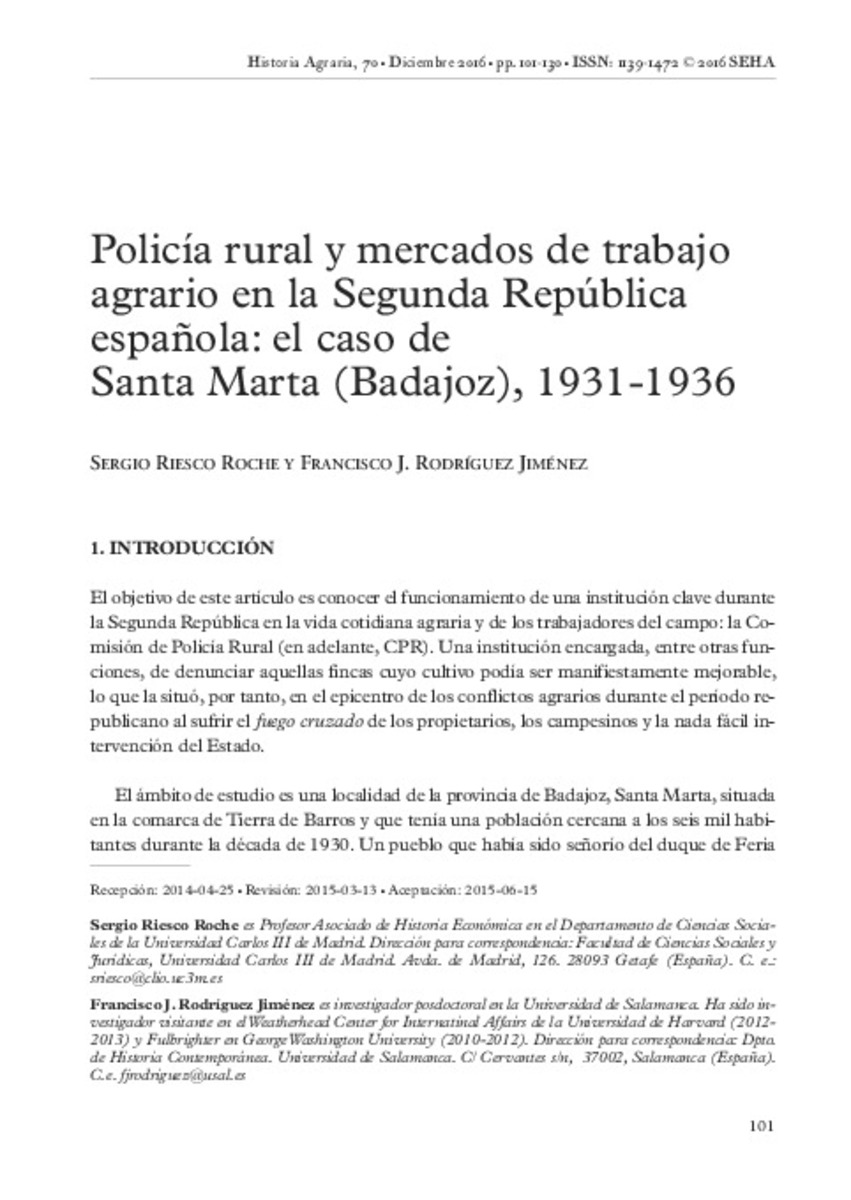Mostrar el registro sencillo del ítem
Policía rural y mercados de trabajo agrario en la Segunda República española: el caso de Santa Marta (Badajoz), 1931-1936
| dc.contributor.author | Riesco Roche, Sergio | |
| dc.contributor.author | Rodríguez Jiménez, Francisco J. | |
| dc.date.accessioned | 2017-03-10T15:30:06Z | |
| dc.date.available | 2017-03-10T15:30:06Z | |
| dc.date.issued | 2016-12 | |
| dc.identifier.issn | 1139-1472 | |
| dc.identifier.uri | http://hdl.handle.net/10234/166635 | |
| dc.description.abstract | Instrumental in supporting the agricultural reforms enacted during the Second Republic, the regulations on compulsory cultivation and the Rural Police Commission exhibited both positives and negatives. This article reveals details of events related to this Commission in the town of Santa Marta, in the province of Badajoz. The full minutes of the executive meetings of this organisation have been preserved in the Municipal Archives, a rather exceptional circumstance as in most cases they have entirely disappeared. Up until now, historiography has been silent on many aspects of the Rural Police Commission, such as its constitution, its relationship with the political life of the period, the kind of agricultural plantations that its mandate covered, the effectiveness of its actions, the reactions and hopes it awakened among owners and workers, etc. We try to address these matters by cross-referencing the aforementioned local documentation with the national legal corpus on rural police institutions. The analysis is completed by comparing the evidence in this case with data from institutional economics. | ca_CA |
| dc.description.abstract | Con sus luces y sus sombras, la normativa de laboreo forzoso y la Comisión de Policía Rural fueron piezas clave paralelas a la reforma agraria de la Segunda República. Este artículo analiza lo sucedido en torno a esa Comisión en un pueblo de Badajoz, Santa Marta, en cuyos Archivos Municipales aparecieron las actas íntegras de dicho organismo. Se trata de una circunstancia bastante excepcional, puesto que en la mayoría de los casos han desaparecido. Así las cosas y a día de hoy, la historiografía guarda silencio sobre muchos aspectos de su constitución, su vinculación con la vida política del período, el tipo de fincas que se vieron inmersas en sus pesquisas, su eficiencia, las reacciones y esperanzas que desató. Trataremos de aclarar estos interrogantes, cruzando la documentación local mencionada con la escasa bibliografía existente sobre este tema y el corpus legal donde se menciona. Un análisis que concluirá tratando de cruzar la evidencia del caso con la economía institucional. | ca_CA |
| dc.format.extent | 30 p. | ca_CA |
| dc.format.mimetype | application/pdf | ca_CA |
| dc.language.iso | spa | ca_CA |
| dc.publisher | Sociedad Española de Historia Agraria (SEHA) | ca_CA |
| dc.relation.isPartOf | Historia agraria: revista de agricultura e historia rural, nº 70, 101-130 | ca_CA |
| dc.rights | © 2016 SEHA | ca_CA |
| dc.rights.uri | http://rightsstatements.org/vocab/InC/1.0/ | * |
| dc.subject | Segunda Republica | ca_CA |
| dc.subject | Spanish Second Republic | ca_CA |
| dc.subject | Reforma agraria | ca_CA |
| dc.subject | Agrarian reforms | ca_CA |
| dc.subject | Conflictos sociales | ca_CA |
| dc.title | Policía rural y mercados de trabajo agrario en la Segunda República española: el caso de Santa Marta (Badajoz), 1931-1936 | ca_CA |
| dc.type | info:eu-repo/semantics/article | ca_CA |
| dc.subject.jel | D02 | ca_CA |
| dc.subject.jel | O17 | ca_CA |
| dc.subject.jel | Q15 | ca_CA |
| dc.subject.jel | Q34 | ca_CA |
| dc.rights.accessRights | info:eu-repo/semantics/openAccess | ca_CA |
| dc.relation.publisherVersion | http://www.historiaagraria.com/numero.php?n=70 | ca_CA |







